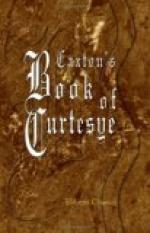P) O fader & fownder of ornate eloquence
that Illumyned hast
all[e] owre bretayne!
To sone we loste thy lavreat science,
332
O lusty lyqvovre of that
fulsu_m_ fontayn_e_!
O cursed det[=h]! why hast
thou that poete slayn_e_,
I mene fader chavucer,
mayst_er_ galfryde?
Alas the
while that ever he from vs dyed!
336
P) Redyt[=h] his werkes full[e] of plesavnce,
Clere in sentence, I_n_ langage
excellente:
Bryefly to wryte, such was his suffysavnce,
What-ever_e_ to say he toke
i_n_ his entente, 340
his langage was so fayer_e_
& p_er_tynente,
yt semet[=h] vnto
manys heryng
Not only the worde,
but veryly the thyng. 343
P) Redyth, my child, redyth his bookes all[e],
Refusith Non, they ben expedyente;
sentence or langage, bot[=h] fynd ye shall[e];
ffull[e] delectable that good
fader mente,
for all[e] his purpose & his
hole entente 348
[was] how to please
in eu_er_y audyence,
& In owr_e_ tonge
was well[e] of Eloquence.
CAXTON’S TEXT.
[48]
[Sidenote: Leaf 163, back.]
O fader and founder of ornate eloquence
[Sidenote: and the Father and Founder of Eloquence,]
That enlumened hast alle our bretayne
To soone we loste / thy laureate scyence
332
O lusty lyquour / of that fulsom fontayne
O cursid deth / why hast thou [th]^t poete slayne
I mene fader chaucer / maister galfryde
[Sidenote: mayster Galfryde Chawcer,]
Alas the whyle / that euer he from vs dyde
336
[49]
[Sidenote: Leaf 9 a.]
Redith his werkis / ful of plesaunce
[Sidenote: whose works are full of pleasaunce,]
Clere in sentence / in langage excellent
Briefly to wryte / suche was his suffysa[=n]ce
339
What euer to saye / he toke in his entente
His langage was so fayr and pertynente
It semeth vnto mannys heeryng_e_
Not only the worde / but verely the thynge
343
[Sidenote: whose language seems not only words,
but truly things.]
[50]
Redeth my chylde / redeth his bookes alle
Refuseth none / they ben expedyente
[Sidenote: Read all his books; refuse
none:]
Sentence or langage / or bothe fynde ye shall_e_
346
Ful delectable / for that good fader mente
[Sidenote: he is delightful.]
Of al his purpose / and his hole entente
How to plese in euery audyence
And in our tunge / was welle of eloquence
350
* * * * *
THE ORIEL TEXT.
[51]




